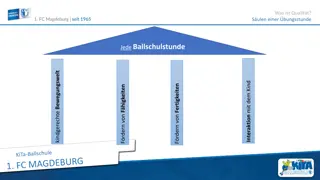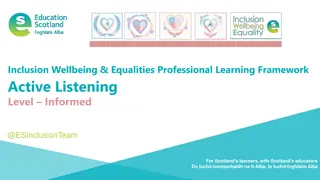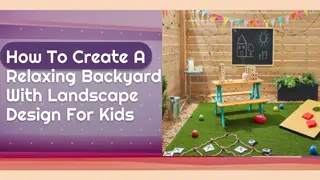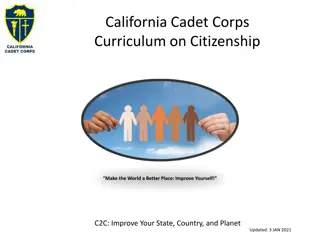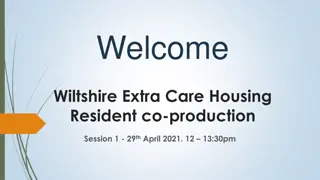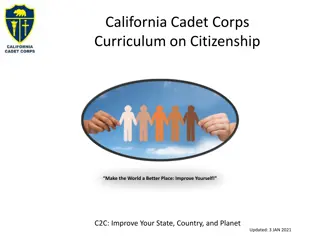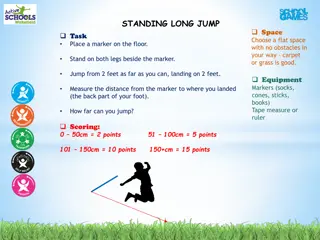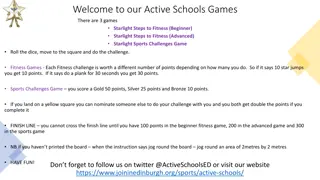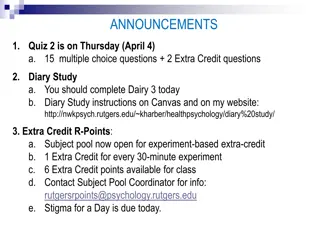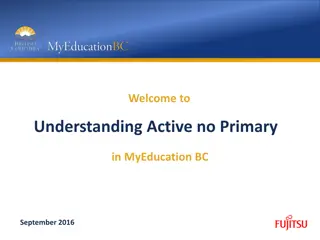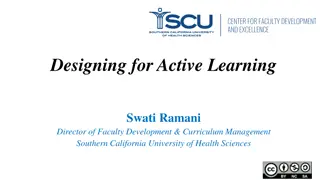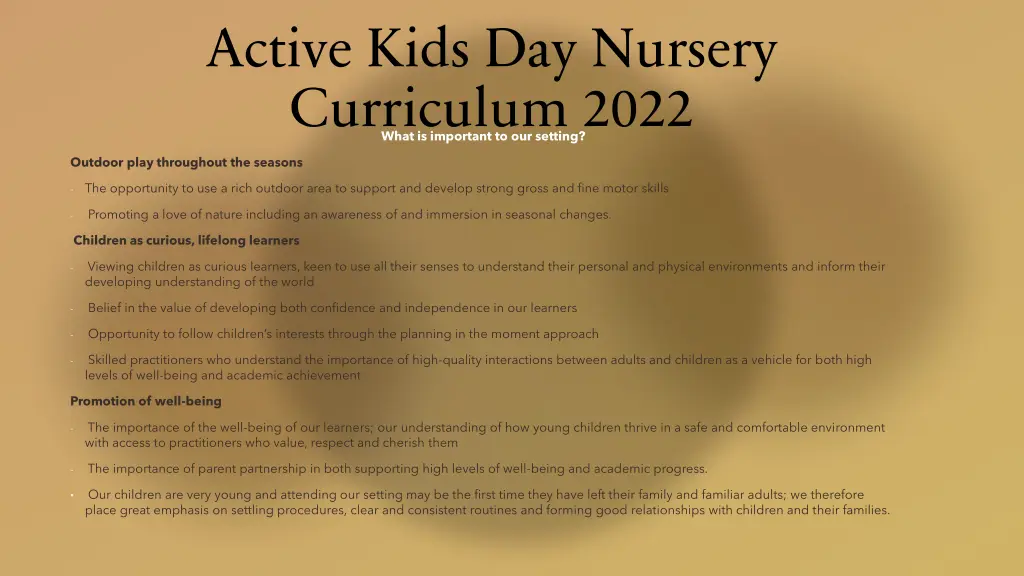
Nurturing Young Minds: Active Kids Day Nursery Curriculum Insights
Explore the Active Kids Day Nursery Curriculum focusing on outdoor play, nature appreciation, and promoting well-being. Discover how the curriculum aims to develop children's confidence, independence, and critical life skills while fostering strong relationships with both children and families.
Download Presentation

Please find below an Image/Link to download the presentation.
The content on the website is provided AS IS for your information and personal use only. It may not be sold, licensed, or shared on other websites without obtaining consent from the author. If you encounter any issues during the download, it is possible that the publisher has removed the file from their server.
You are allowed to download the files provided on this website for personal or commercial use, subject to the condition that they are used lawfully. All files are the property of their respective owners.
The content on the website is provided AS IS for your information and personal use only. It may not be sold, licensed, or shared on other websites without obtaining consent from the author.
E N D
Presentation Transcript
Active Kids Day Nursery Curriculum 2022 What is important to our setting? Outdoor play throughout the seasons - The opportunity to use a rich outdoor area to support and develop strong gross and fine motor skills Promoting a love of nature including an awareness of and immersion in seasonal changes. - Children as curious, lifelong learners Viewing children as curious learners, keen to use all their senses to understand their personal and physical environments and inform their developing understanding of the world - Belief in the value of developing both confidence and independence in our learners - Opportunity to follow children s interests through the planning in the moment approach - Skilled practitioners who understand the importance of high-quality interactions between adults and children as a vehicle for both high levels of well-being and academic achievement - Promotion of well-being The importance of the well-being of our learners; our understanding of how young children thrive in a safe and comfortable environment with access to practitioners who value, respect and cherish them - The importance of parent partnership in both supporting high levels of well-being and academic progress. - Our children are very young and attending our setting may be the first time they have left their family and familiar adults; we therefore place great emphasis on settling procedures, clear and consistent routines and forming good relationships with children and their families.
Intent Why we do what we do 17/08/2022 2
Implement How we will teach our children 3
Impact What did the children learn from our teachings? The impact of the curriculum is to ensure all the children leave Active Kids with confidence, resilience and life skills that can take them further in life as they feel valued from the start. The impact on each child will be assessed, so we are consistently observing each child to see if they are reaching the end goal or beyond. This means we can adapt the curriculum if we feel it does not suit the children.
Areas Of Learning Communication and language development Communication and language development We want our children to be able to listen to others and participate in and formal conversations (both verbal and nonverbal), express themselves, to articulate their needs, interests and ideas. We support our children to develop a rapidly expanding vocabulary, to enjoy a wide range of stories and rhymes and be able to join in familiar exchanges and simple songs, as appropriate to their age and stage of development. We also expect our children to be able to follow clear instructions formed from our daily routines to ensure the safety of the children. We also expect our children to use their manners when speaking to any staff member or peer. 0-2 Years 2-3 Years 3-4 Years Reach or point to something they want while making sounds Start to develop conversation, often jumping from topic to topic. Use a wider range of vocabulary. Understand a question or instruction that has two parts; get your coat and wait at the door please . Constantly babble and using single words Listen to simple stories and understand what is happening, with the help of pictures. Use intonation- Pitch and a change in volume when talking. Understand and act on longer sentences like make teddy jump , find your coat . Understand why questions like why do you think caterpillar got so fat? Make themselves understood and can become frustrated when they cannot. Understand simple questions about who , what and where . Start to say how they are feeling, using words as well as actions. We provide children with various different experiences that will help to extend their vocabulary by explaining unfamiliar words and concepts. Shared book-reading is a powerful way of having extended conversations with children. Every day we share picture books with children and encourage them to talk about the pictures and the story, we can also check our children's understanding by asking them to show us particular objects or pictures in the book. Still allowing 10 seconds for the child to process the question and think of their reply. Identify familiar objects Develop pretend play putting baby to sleep or driving the car to the shops Consistently responding to babies babbles and sounds enables the children to begin to understand and listen, which all happens before speech. 5
Areas Of Learning Personal, social and emotional development Personal, social and emotional development We expect our children to feel safe and confident in their learning environment and in their interactions with their peers and the familiar adults in the setting. We expect our children to learn about turn taking and sharing to help their interactions with their peers. We expect our children to develop a resilient attitude to new tasks and/or challenges. We expect our children to understand and follow the rules of simple small group games. We expect our children to be happy and joyous learners who begin to understand their feelings and the differences between each individual and why they are all important. 0-2 Years 2-3 Years 3-4 Years Find ways to calm themselves by being comforted by their key person. We learn from the child's family about how they soothe their child and what to look out for. Managing transitions. Support children as they navigate their different ways of managing their feelings when someone leaves. Develop their sense of responsibility and membership of the community by giving them appropriate tasks to carry out. Become more outgoing to unfamiliar people within the safe context of Nursery. Thrive as they develop self-assurance. Provide consistent, warm and responsive care. Establish a sense of Self. We respond and build on babies expressions and gestures, playfully exploring. Show more confidence in social situations. Finding solutions to conflicts. Model how to listen to each other and agree to compromise. Feel strong enough to express a range of emotions. To feel emotionally safe with their key person and gradually other staff. Express preferences and decisions. Be positive and interested in what babies do as they develop their confidence. We explain why we have rules and how they help us be safe. Increasingly following rules and understand why they're important. Grow in independence by rejecting help. Enhance co-operation and resilience for the child whilst also implementing appropriate boundaries and routines. Engage through gestures and use the engagement to achieve a goal. We enable our children to make their own choices during activities and meal times. Talk about their feelings using words like happy, sad, angry or worried. Model ways to calm ourselves and express our feelings. 6
Areas Of Learning Physical development Physical development We expect our children to develop both confidence and control in using their whole bodies; to be able to walk, run, jump and dance with ease and control. We expect our children to develop their spatial awareness and co-ordination and to be able to operate wheeled equipment such as riding a bike. We expect our children to begin to develop control over their bodies to enable them to sit safely and focus on their early mark making skills, including developing their pincer grip. We expect our children to develop their self-care skills including attempting to dress and undress themselves, to self serve food, to develop control and awareness in toileting skills. 0-2 Years 2-3 Years 3-4 Years Learning to roll, sit without support, crawl, pulling themselves up and bouncing. We encourage the child to use us for help. Sit on a push along wheeled toy. Go up a step or stairs or apparatus using alternate feet. Spin, roll and independently use ropes and swings. Skip, Hop, Stand on one leg for games. Use large muscle movements to wave flags, streamers, paint and make marks. Reach for objects as co-ordination develops. We continuously engage with the child, swapping toys. Passing items from one hand to the other, then to other people. Use large and small motor skills to do things independently, for example trying to do buttons, zips and pour drinks. Using one handed tools and equipment like scissors. Showing an increasing desire to be independent by wanting to feed and dress themselves. Show preference for dominant hand. Fit themselves into spaces, tunnels, dens etc. Encouraging children to do so unaided and to stop if they don t feel safe. Use a comfortable grip with good control when using pens or pencils. Start eating independently and learning how to use a knife and fork. Be increasingly independent when getting dressed such as helping with putting coats on and doing buttons/zips. We encourage by helping or showing different ways in which to do things but leaving the final steps to them. TOILET Training Throwing and kicking balls. Begin to walk, run, jump and climb. 7
Areas Of Learning Literacy Literacy We expect our children to enjoy a wide range of stories and rhymes and be able to join in familiar refrains and simple songs, as appropriate to their age and stage of development. We expect our children to begin to write their names by distinguishing between the marks they make and give meaning to what they draw and paint. 0-2 Years 2-3 Years 3-4 Years Enjoys songs and rhymes. Enjoys sharing books with an adult. We provide enticing areas for sharing books. Engage in extended conversations about stories, learning new vocabulary. Joins in with some songs, copying sounds, rhythms and tempo. Use some of their print and letter knowledge in their early writing. We motivate children by providing opportunities in a wide range of ways. Pays attention and responds to the pictures. Says some words in the song. Copies finger movements and gestures. Has a favourite book and seeks them out to share with others. Sings songs and say rhymes independently. Write some or all of their name. Repeats words and phrases from familiar stories. We help the children to explore their favourite books and delve deeper into them. Write some letters accurately. We choose songs that reflect the range of cultures and languages of children in the 21st century, We also use props and musical instruments. Develop play around favourite stories using props. Notice some print such as the first letter of their name, bus, or door number, or familiar logo. Enjoys drawing freely. Adds marks to their drawing which they give meaning to. 8
Areas Of Learning Expressive arts and design Expressive arts and design We expect our children to express themselves and their ideas through dance, art and music. We expect our children to experience a range of self-serving activities to develop their understanding of materials and to work as part of a group during mealtimes. 0-2 Years 2-3 Years 3-4 Years Show attention to sounds and music. Make rhythmical and repetitive sounds. Take part in pretend play. Move and dance to music. Explore instruments and play with them in different ways. Begin to develop complex stories using small world equipment Anticipate phrases and actions like Peepo . Explore paint using fingers and other body parts as well as brushes and other tools. Develop their own ideas and then decide which materials to use to express them. Explore their voices and like making sounds. Join different materials and explore different textures. Express ideas and feelings through marks they make. Joins in with songs, sometimes making sounds. We achieve this by listening and understanding the children and what they want to achieve before we offer suggestions. Our crafts and mark making are available all day at the children's convenience. Enjoy and take part in action songs such as twinkle twinkle. We stimulate their enjoyment of music and singing by providing this throughout the day with music from different genres and cultures. We model to our children during song time and provide an array of materials for the children to explore, combined with out encouragement. 9
Areas Of Learning Understanding the world Understanding the world We expect our children to love investigating the outdoor environment and develop a love of nature this will include developing their understanding of growth and the care of plants, together with their familiarity of minibeasts and their impact on the land. 0-2 Years 2-3 Years 3-4 Years Repeat actions that have an effect. Explore and respond to different natural phenomena in their setting and out. Use all senses in hands-on exploration of all materials. Explore materials with different properties, indoors and outside. Make connections between the features of their family and others families. Talk about what they see, using a wide vocabulary. Notice the difference between people. Explore how things work. We provide our babies with open-ended materials indoors and outdoors, encouraging them to explore and use different movements to achieve new actions. Plant seeds and take care of growing plants. We encourage our toddlers to explore the natural world, as we encourage their exploration, fascination, curiosity and appreciation and respect for all living things. Begin to understand the need to respect and care for the natural environment and all living things. We provide natural materials and equipment to explore and investigate to then talk about. We model observational skills and speak aloud to the group. 10
Areas Of Learning Mathematics Mathematics We expect our children to be engaged in a range of practical real and play activities to develop their concept of numbers 1-10, measures and patterns within this will include engagement with a wealth of malleable materials. To see our evidence of our curriculum in action take a look at our children s online learning journals. 0-2 Years 2-3 Years 3-4 Years Combine objects like stacking blocks and cups. Build with a range of resources. Develop fast recognition of up to 3 objects without having to count them individually. Complete inset puzzles. React to changes of amount in a group of up to 3 items. Compare weights- bigger, smaller, high, low, tall, heavy. Recite numbers up to 10. Compare amounts saying Lots, More, Same . Say one number for each item in order 1,2,3,45. Notice patterns and arrange things into patterns. Count in everyday contexts, sometimes skipping numbers 1,2,3,5. Recognise the difference between 2D and 3D shapes. 11
So, what do our children know and can do as a result of the curriculum we offer? The curriculum we offer is intertwined with our mission statement, values and view of the child as a curious individual learner; the curriculum consists of the daily routines we put in place, the emphasis on outdoor and indoor learning, our knowledge of the typical developmental milestones for children 0 5 years old and the attitude to learning we chose; play based and rooted in real practical experiences alongside a skilled and caring practitioner. To enable our children to achieve our intentional learning goals, we work through the Early Years Foundation stage, ensuring our children are meeting the required milestones at each age and stage. The EYFS has 7 different areas of learning- Three Prime Areas: Personal, Social and Emotional Development, Physical Development and Communication and Language. The Specific Areas are: Literacy, Mathematics, Understanding the World and Expressive arts and Design. The Development Matters is linked into the Early Years Foundation Stage, we use this as children develop quickly in the early years and practitioners aim to do all we can to help children have the best possible start in life. The EYFS helps us as practitioners to support children's learning and development by closely watching what we provide for a child's current needs and also suggesting their next steps. We have an on-going formative assessment which is: Observation wow - look, listen and note. Assessment- analysing observations and deciding what they tell us about children. Planning- what's next? experiences and opportunities, learning environment, resources, routines and the practitioners role.
Overview To summarise, throughout our curriculum we have used the EYFS as our base layer for our children's learning. From that, we have created our curriculum which is entirely unique to us, our setting and our children. Our curriculum is part of the forever flowing circle of continuous development; Curriculum, Planning, Individual Interests, Learning Goal, Assessment. By doing this we are ensuring our children are receiving the best possible start to their early education as there are plenty of opportunities for WOW moments due to our continuous development cycle. We recognise that we will have opportunities to exercise cultural capital and will be introducing this into our planning at every opportunity. The 5 British Values are also embedded into the early years framework; Democracy, Rule of Law, Individual Liberty, Mutual Respect and Tolerance for those with different faiths and beliefs. This is all within our daily routines here at Active Kids.
Thank you for reading our curriculum 3/1/2024 SAMPLE FOOTER TEXT 14




